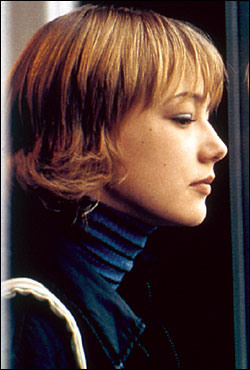THE GOLDEN BOWL
directed by James Ivory with Nick Nolte, Uma Thurman, Kate Beckinsale, and Jeremy Northam
opens May 18 at Guild 45th
MERCHANT-IVORY’S THIRD outing with Henry James opens with a flashback in which a pair of adulterous Renaissance lovers—stepmother and young stepson—are discovered, denounced, and beheaded. The beheading is in silhouette; the sequence itself has an unintended whiff of Roger Corman to it that’s hilarious, considering Merchant-Ivory’s hallmark tastefulness. The scene isn’t simply foreshadowing; it’s a cautionary tale for the dim, since Bowl‘s quadrangle of lovers is steeped in incest, real or unacknowledged. Next, we get explanatory titles, newsreel style: “Adam Verver—America’s First Billionaire,” and “Adam Verver’s Rented Palace.” By the end, it feels as though screenwriter Ruth Prawer Jhabvala has helpfully highlighted the novel for us with a bold yellow marker, making obvious what James took such pains to tell with delicacy—the motives, intentions, and levels of knowledge, the who-knows-what-and-when-did-they-know-it?
This has the effect of making Bowl the priciest, most sumptuous Cliff’s Notes movie imaginable, and nuance be damned. This quality is certainly in the Merchant-Ivory tradition of not trusting an audience with subtlety. (Check out the ruinous last scene of their otherwise fine Mr. and Mrs. Bridge.)
Bowl‘s long-dead Italian lovers are ancestors of Prince Amerigo (Jeremy Northam, elegantly bearded and with a pretty creditable accent). The flashback is his juicy rendering of their story told to American expat Charlotte Stant (Uma Thurman) while he shows her around his decaying Roman castle—and tries to avoid her clinging embrace.
Former lovers, Charlotte and Amerigo understand that since they’re both “poor people,” by 1901 standards, marriage is impossible. Now, Amerigo has become engaged to Charlotte’s closest friend, the gentle, beautiful young heiress Maggie Verver (Kate Beckinsale), who knows nothing of that old relationship. Desperate for one last, quasi-innocent contact, Charlotte persuades Amerigo to go wedding-present shopping with her.
IN A BLOOMSBURY antique store, they spot an extraordinary bowl made from a single piece of crystal fired with gold. Charlotte thinks it’s ideal. The prince, however, spots its hairline crack and believes it’s a bad omen. Unpurchased, the bowl lives on as the film’s heaviest symbol. Maggie’s gala marriage and subsequent birth of a son have the effect of “spoiling the symmetry” of life with her beloved father, Adam Verver (Nick Nolte), who is remarkably astute and educated as billionaires go. After his wife’s death years earlier, Adam dragged young Maggie with him as, J.P. Morgan-style, he bought up most of Europe’s great art. It is for his magnum opus: a museum bringing culture to his hometown, “American City,” whether its hard-working citizens want it or not. (From the film’s newsreels of the time, it appears they’d really prefer a decent rail system. Odd, how very little things change.)
Feeling that she has abandoned her father, Maggie invites Charlotte to their treasure-crammed English estate—and, before you can say “rapacious,” penniless Charlotte is Mrs. Adam Verver and unlikely stepmother to both Maggie and Amerigo.
Charlotte believes she and Amerigo can carry on exactly as they did before their marriages. Certainly Maggie and Adam do; now father and daughter are closer than ever, leaving Charlotte and Amerigo to sport at madcap English country weekends. (Noel Coward would have adored these goings-on.)
Now begins a cat’s cradle of intrigues and suspicions, in which tables are unexpectedly turned and the “weak” and “innocent” reveal surprising fortitude. Experience does count: Nolte gives the film’s strongest, most layered performance. While Beckinsale and Northam are fine, the ravishing Thurman needs to suggest that there’s more to Charlotte—supposedly multilingual and worldly—than her single note of near-hysteria as she obsessively pursues Amerigo. Considering that the movie has lost James’ sensibilities, it’s ironic that Merchant-Ivory has created a perfect Jamesian metaphor: a beautiful-looking but flawed performance, like the golden bowl with just a hairline crack.








